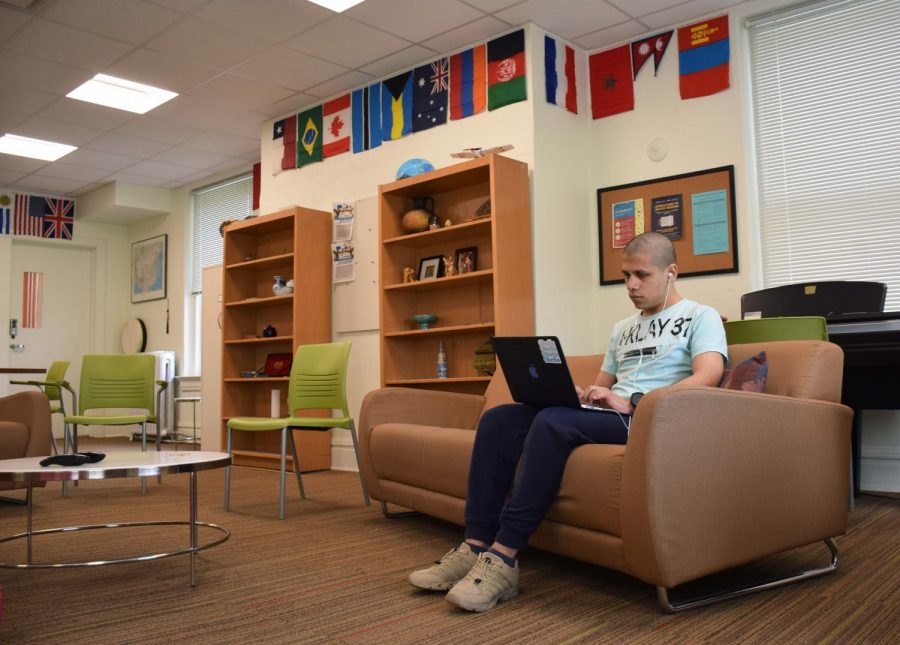Admissions to Diversify International Student Population
College first-year Marwan Ghanem works on his laptop in the International Student Resource Center.
Oberlin has seen a steady increase in international student enrollment over the past several years, and is currently looking to implement changes to continue increasing diversity in the student body.
Josh Whitson, director of the International Student Resources Center and assistant dean of students, reports that, although his office is not in charge of admissions recruitment, Oberlin always works to expand diversity.
“The idea is to always bring in as diverse of a class as possible,” Whitson said.
This is why, over the last few years, the number of international students has increased at Oberlin. Currently, international students make up about 11 percent of the student body, almost double the amount in 2008, when the amount was around six percent.
According to Senior Assistant Director of Admissions Sophie Mettler-Grove, who is in charge of international recruitment, having international students at about one-tenth of the student population is fitting for Oberlin’s priorities.
“Our growth in international students reflects our continuous commitment to being a highly diverse community which values global experiences, perspectives, and identities,” Mettler-Grove wrote in an email to the Review. “We have been around 11 percent, and that feels comfortable given our various enrollment priorities.”
In the 2017–2018 school year, colleges comparable to Oberlin enrolled similar percentages, with Wellesley and Swarthmore both enrolling international students at around 13 percent of the student body.
Mettler-Grove says that the majority of Oberlin’s current international students are from China, followed next by India and then Vietnam. Efforts to diversify the international student body include recruitment of individuals from different parts of Europe and Asia.
“These are the areas that already know us, and we want to expand our name recognition and representation of the regions on campus,” Mettler-Grove said.
One challenge international students face comes from the rhetoric and policies of the current Trump administration. In addition to the travel ban, there have been many small changes that make the process of coming to the U.S. for college more difficult. For example, the I-765 form for employment after graduation has increased from two pages to seven pages under the current administration.
Other challenges with recruitment include the fact that many students outside the U.S. do not understand what a liberal arts education entails. Additionally, countries like China, the Netherlands, and Canada are starting to draw students away from the U.S. The United States’ extended visa and the high cost of education can make these other countries more attractive to students looking to study outside of their home country.
Whitson’s office helps students navigate various bureaucratic tasks associated with immigration. Often this can be a difficult task. Whitson says, for example, if an American student finds an internship in finance but is a biology major, taking such an opportunity is not a problem. However, for an international student, internships or off-campus jobs must be related to their area of study and go through a process of Curricular Practical Training authorization. Even for things as simple as adding a major or minor, there is immigration paperwork that needs to be updated.
The office also supports students with living far away from home. For example, because many international students do not go home for breaks, the office will help them stay in The Hotel at Oberlin for winter break and subsidize the cost based on need.
Conservatory first-year Linda (Xiang) Su says the International Student Center aided with her transition to Oberlin.
“[The International Student Center] holds many events, activities, and groups, like the Chinese Student Association,” Su said.
College first-year Liam Mai echoed this, saying he felt very supported at Oberlin.
“I feel like I have more than enough resources,” Mai said.
Other international students, like College junior Maryam Ghazala, have contrasting feelings.
“There are good resources for international students on campus and Josh Whitson has been a very helpful resource but, overall, I don’t think the resources we have are enough,” Ghazala wrote in a message to the Review. “There is a lot that can be done in terms of academic and career advising and mentorship for international student that would improve their college experience.”





